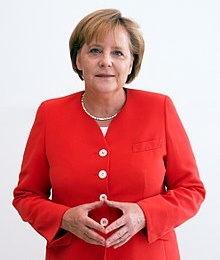‘Mutti’ Merkel gets fourth term after deal with Social Democrats
05 Mar 2018
Germany's Social Democratic Party (SPD) voted to renew a coalition with Chancellor Angela Merkel's Christian Democrats (CDU), paving the way for her fourth term after nearly six months of political deadlock.
 | |
| German Chancellor Angela Merkel |
The postal ballot saw 66 per cent of the centre-left party's 360,000 members vote in favour and 34 per cent against the grand coalition, SPD treasurer Dietmar Nietan announced Sunday, paving the way for Merkel to lead Germany for four more years.
"This wasn't an easy decision for the SPD," acting party chairman Olaf Scholz said Sunday in Berlin. "In the discussion [about the deal], we've come closer together. That gives us the strength for the process of renewal we are embarking upon.
"The new government could be in place by the end of March after the federal election on 24 September saw both parties lose a record number of votes and left few coalition options for Merkel.
Merkel has led Europe's largest economy since 2005. If she finishes her fourth term, she will have been in power for 16 years - equalling Helmut Kohl as the country's longest-serving chancellor. The deal will also lead to her third grand coalition during her time as chancellor.
German lawmakers are expected to re-elect Merkel as chancellor on 14 March.
"I congratulate [the SPD] on this clear result and look forward to further cooperation for the benefit of our country," Merkel said in a translated Twitter statement.
Germany's September 2017 election was supposed to be an easy victory for Merkel's CDU, and she was expected to cruise to her fourth term in office as Chancellor.
Instead, voters revolted against the status quo. Both CDU and the SPD barely maintained their status as Germany's top parties, suffering record losses and losing millions of votes to the far-right nationalist party, Alternative for Germany (AfD), which took nearly 13 per cent of the vote.
The surprise result spurred months of painful negotiations, as Merkel's party tried to hammer out a coalition agreement.
After coalition talks between the CDU, the liberal Free Democratic Party (FDP) and the Green Party collapsed in November, a renewal of the so-called Grand Coalition (or "GroKo") was the only remaining multiparty option.
Former SPD leader Martin Schulz had ruled out a new GroKo, but was forced into negotiations as the alternative prospect of new elections loomed.
Widely blamed for the turmoil within his party since the election, Schulz stepped aside last month. Andrea Nahles, a former minister of labour and social affairs, is likely to be confirmed as the party's first ever female leader at a party conference in April.
Under Merkel's leadership, the CDU has been seen as a Europe-wide emblem for liberal-minded conservatism that refuses to collaborate with the xenophobic far right - in stark contrast to Austria's Christian Democrats.
More than a million refugees entered Germany in 2015 as a result of Merkel's open-door migration policy, sparking a heated national debate about immigration and integration in the country.
In October, Merkel agreed to aim for a limit on Germany's refugee intake, marking a significant retreat from her previous rejection of a cap.
The proposed limit was one of a number of compromises Merkel has been forced to make with conservative sister party the Christian Social Union (CSU), since September's disastrous election results.
'Mutti' (mother), as Merkel is known, still faces many more challenges - not least of which is distributing ministerial portfolios with her new coalition partners. Ministry positions will be announced in the next few weeks.
The coalition deal also means the far-right AfD is now the lead opposition party in parliament.
The AfD was founded in 2013 and its virulently anti-immigration platform proved popular with voters in the September election.
The party surged into third place in the election, the first time in decades that a far-right, openly nationalist party had won seats in Germany's federal parliament.




















